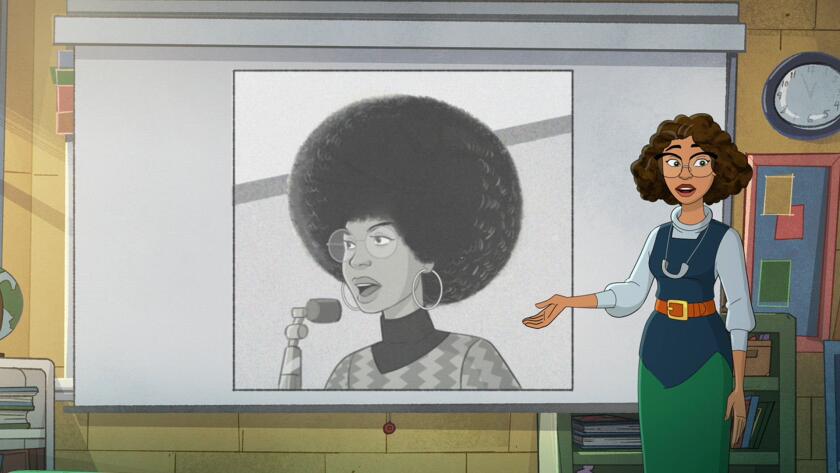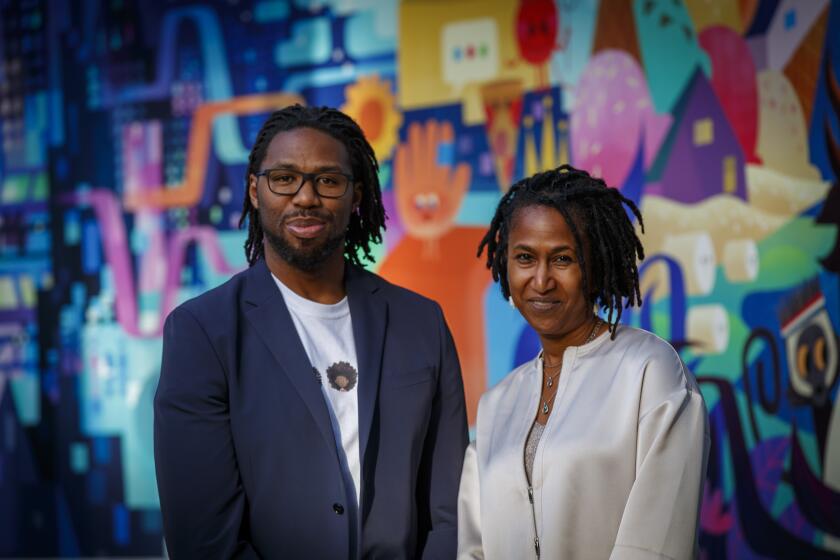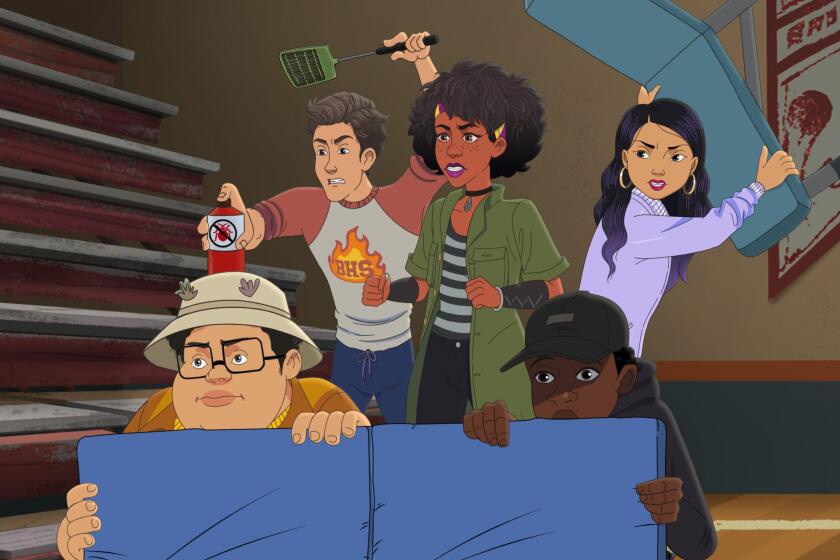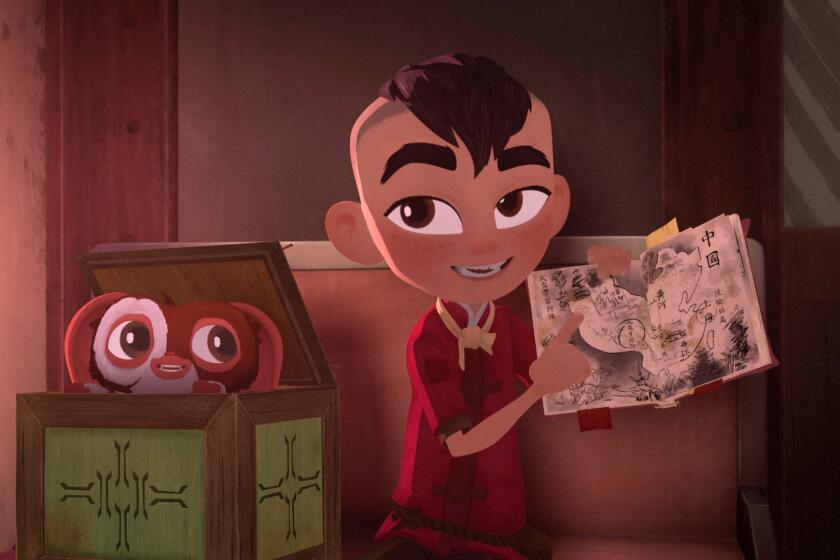With ‘Young Love,’ Matthew A. Cherry wanted to depict parents in their 20s who are still figuring out life
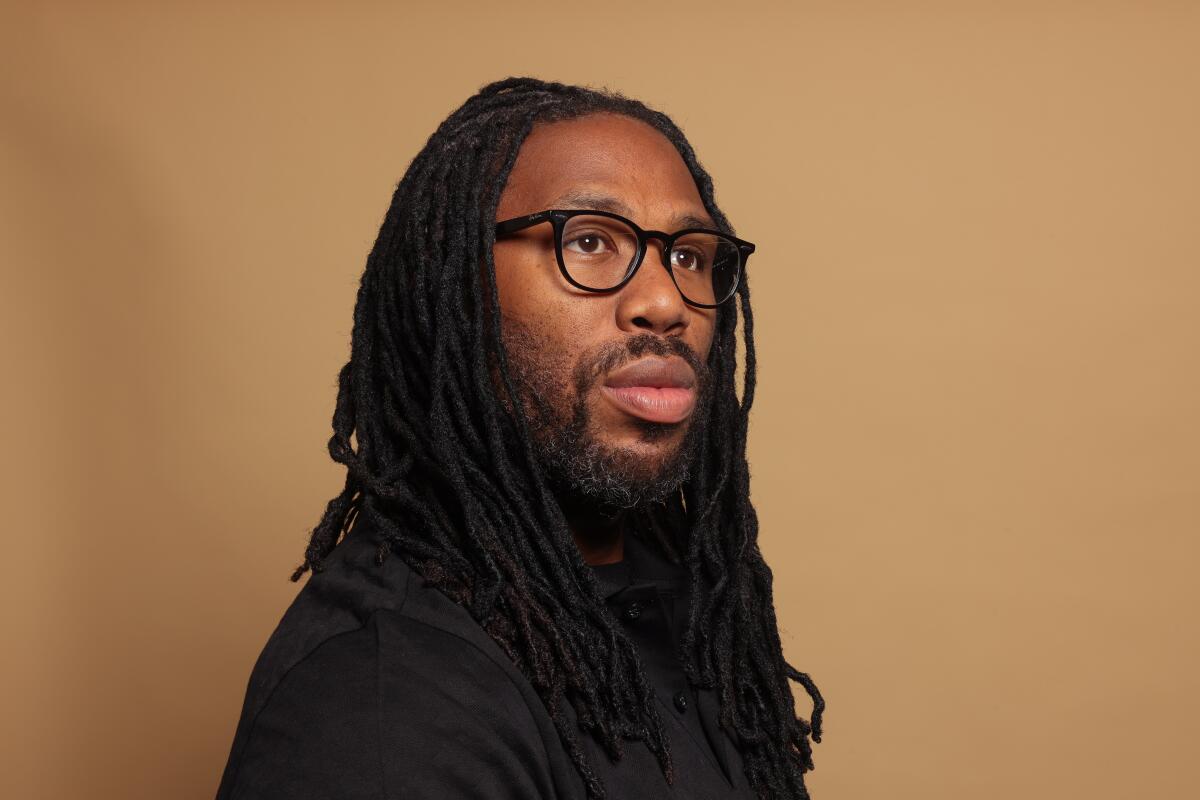
The first season of “Young Love” follows Angela Young and her family as they navigate life after the young mother’s cancer is in remission.
For Angela (voiced by Issa Rae), this includes going back to work and having to convince her friends and family that she’s not as fragile as they try to treat her. Her partner, Stephen Love (Scott Mescudi, also known by his stage name Kid Cudi), resumes the grind as a struggling music producer and is often subject to the whims of a local semi-famous rapper. And their young daughter Zuri (Brooke Monroe Conaway) gets caught up in her own (mis)adventures involving procrastination, school bullies and more.
“You rarely see what happens after somebody recovers” from cancer, said Matthew A. Cherry, the creator and executive producer of the animated series. “The season follows [Angela] and her journey of trying to find out who she is.”
Described by Cherry as a “grounded, adult, but also kid-friendly show,” “Young Love” is a continuation of “Hair Love,” the 2020 Academy Award-winning animated short written by Cherry, who also directed with Everett Downing Jr. (“My Dad the Bounty Hunter”) and Bruce W. Smith (“The Proud Family”). The final four episodes of Season 1 of the series hit Max on Thursday.
“Young Love” marks Cherry’s first time as showrunner — a role he shared with animation veteran Carl Jones (“The Boondocks”) — as well as his first time in a writers’ room. His storytelling sensibilities have been honed in the live action space, where he’s directed episodes of shows including “Swagger,” “Abbott Elementary,” “Bel-Air” and “The Wonder Years.”
Picking up shortly after the events of “Hair Love,” where we see Stephen stepping up and learning how to do Zuri’s hair before they head to pick up Angela from the hospital, “Young Love” engages with real and relatable everyday issues. Angela and Stephen struggle to pay their bills and have doubts about their careers. Episodes have touched on themes such as artistic integrity, gender roles, exploitation and gentrification.
“Hair Love” filmmakers Matthew A. Cherry and Karen Rupert Toliver discuss their animated short, which is nominated for a 2020 Oscar.
It’s not surprising that the extension of Cherry’s Oscar-winning short is a thoughtful and intentional comedy. “Hair Love” originated as a 2017 Kickstarter campaign that the filmmaker launched in response to the dearth of representation in mainstream animation at the time. His goal was to put the spotlight on a young Black father that counters the misconceptions and negative stereotypes often perpetuated by media, as well as celebrate and normalize Black hair. The short resonated with audiences and was adapted into a bestselling picture book. (It even inspired a line of kids’ hair care products.)
For Cherry, one of the things that sets the Young-Loves apart from other animated TV families are their ages. Whereas the parents in classic animated sitcoms like “The Simpsons,” “Family Guy” and “Bob’s Burgers” are roughly in their 40s, Angela and Stephen are 26.
“The thing that is really cool about them being in their mid-20s is that they don’t have their life figured out yet,” said Cherry. “They know their goals, but they don’t know exactly how they’re going to achieve them yet. They’re still working towards them while they are also trying to be present for their daughter.”
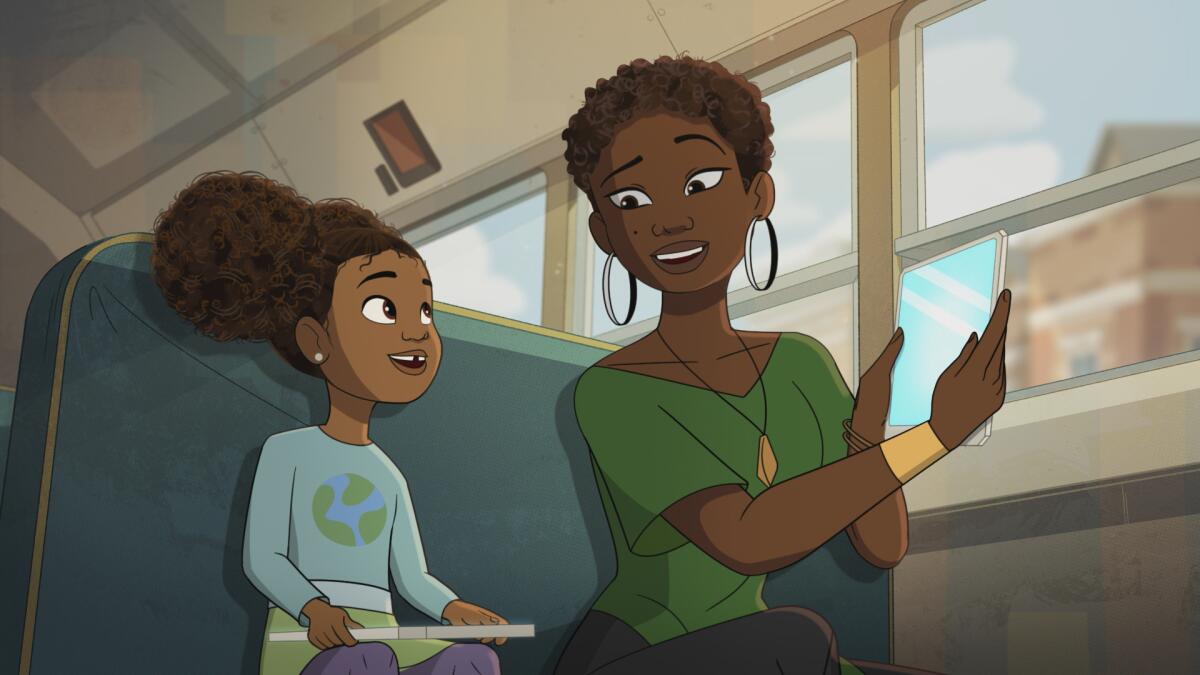
Some seeds of the characters’ broader backstories were planted within the mostly dialog-free “Hair Love,” but it wasn’t until the show’s creative team was assembled that additional details were fleshed out. For example, they knew while creating the short that Stephen was a music producer, explained Cherry. But Stephen’s aversion to conflict is something the team landed on while developing the show.
“A lot of the scenarios that he gets into is because he doesn’t attack things head on,” said Cherry. “He’s like a lot of us. It’s hard to just go to your boss straight on and ask for a raise or ask where your check is that you should have gotten a week ago.”
Similarly, Angela’s past as a natural hair vlogger before her cancer diagnosis is established in “Hair Love.” For the “Young Love” team, it was important that the series acknowledge her illness and explore what it’s like for Angela to be confronted with her mortality in her 20s.
For any animation fans looking to add new (to recent) shows to your streaming queue, here are some titles to check out, including a cozy spin-off of a beloved series and gateway horror from one of the best-known filmmakers in the genre.
“The goals and the dreams that she had before aren’t necessarily the same,” said Cherry. “She’s really trying to figure out her purpose. Angela knows she likes doing hair, but also knows she wants to do more.”
This idea of wanting or needing to pivot from a dream job is something Cherry can relate to. Although he did not experience a health scare, the former NFL wide receiver was also in his mid-20s when he decided to retire from football to pursue a career in Hollywood. Cherry likens his experience to a midlife crisis and admits that leaving a sport he’d been playing since he was 5 to start over on a brand new path was “very anxiety inducing.”
For Cherry, it’s also important that Angela’s journey shows audiences that “it’s OK to change your mind” about what you want to do with your life.
“That’s a big lesson we wanted to give too,” he said. “It’s OK to give yourself some time to figure it out. It’s OK to experiment and try things, too.”
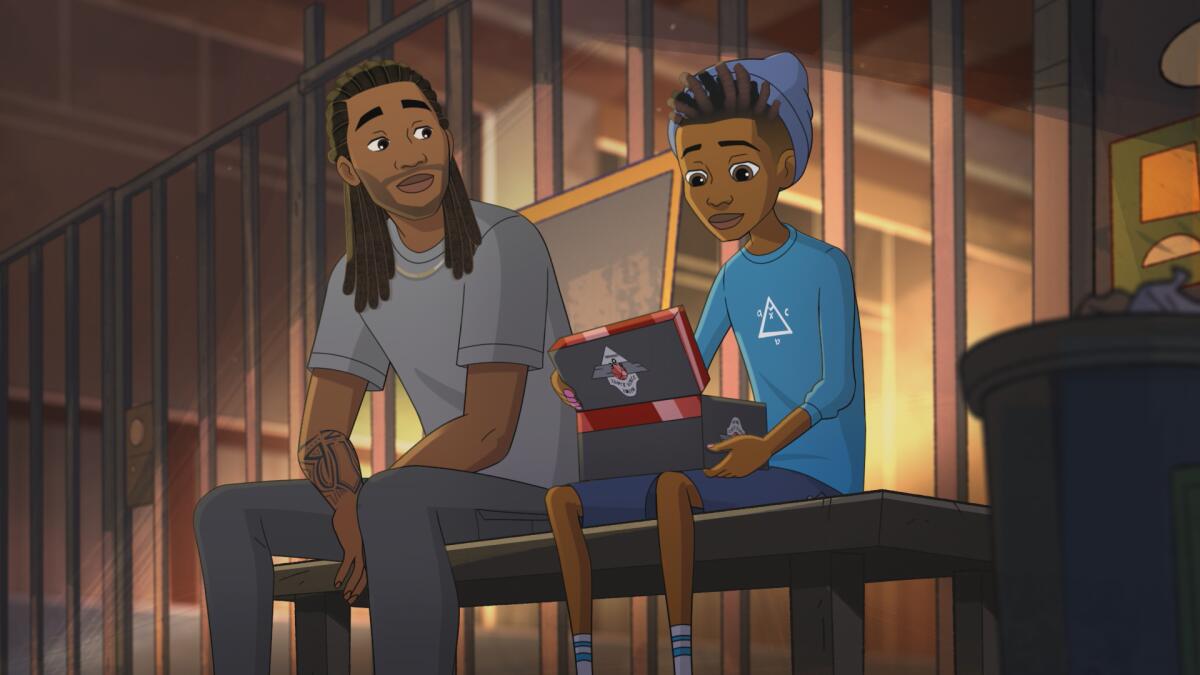
According to Cherry, one of the the biggest challenges in developing the series was finding the right tone. The aim was to create a series that could appeal to both parents and children, just as “Hair Love” was a story families could watch and read together. It’s an increasingly elusive goal at a time when families can choose to watch different things on their individual devices rather than gather around a TV together.
While making a 6-year old relatable to adult viewers seems like an impossible task, Zuri was key to making sure the series was accessible to children. Cherry credits executive producer Karen Rupert Toliver, who also served as a producer on “Hair Love,” for unlocking their show’s approach to Zuri. Her suggestion: elevate Zuri’s dialogue.
“Kids are different today,” said Cherry. “I don’t know if it’s because of social media or YouTube, but they just talk like they’ve been here before. We really wanted Zuri to be a kid like that.”
Zuri’s signature trait is her confidence. The youngster is representative of the Gen Z spirit, with a low tolerance for injustice and a strong desire to change and fix the world. So besides having her speak more like an adult, Cherry explained, the show’s creatives tried to make sure that any issues or problems Zuri encounters were allegorical to those that adults have to deal with.
Executive producers Tze Chun and Brendan Hay discuss Gizmo, Mr. Wing and reclaiming “the somewhat throwaway origins” of the Mogwai in their new animated show on Max.
Zuri’s indignation upon learning that she would not be getting paid for her efforts to hawk cookies since it’s for a fundraiser, for instance, will be familiar to anybody who has ever been told that they are getting compensated with “experience” or “exposure” rather than a paycheck.
Among the characters the showrunner hopes to explore further if “Young Love” gets a second season is Amir, Stephen’s teenage nephew who’s been struggling without his parents, as well as Star, Stephen’s queer producing partner with her own musical aspirations.
For Cherry, “Hair Love’s” success has been a testament to the power of animation; he doubts the short would have had the same reach had it been made in live action.
And while it was the lack of diverse storytelling in mainstream animation that led him to launch his crowdfunding campaign to help create his film, in the six years since, films such as “Spider-Man: Into the Spider-Verse” (2018), “Encanto” (2021) and “Turning Red” (2022) have further proven what he’s always believed about the medium.
“There is something about animation that is inherently universal,” said Cherry. “It’s been really incredible just seeing this shift.”
More to Read
The complete guide to home viewing
Get Screen Gab for everything about the TV shows and streaming movies everyone’s talking about.
You may occasionally receive promotional content from the Los Angeles Times.
